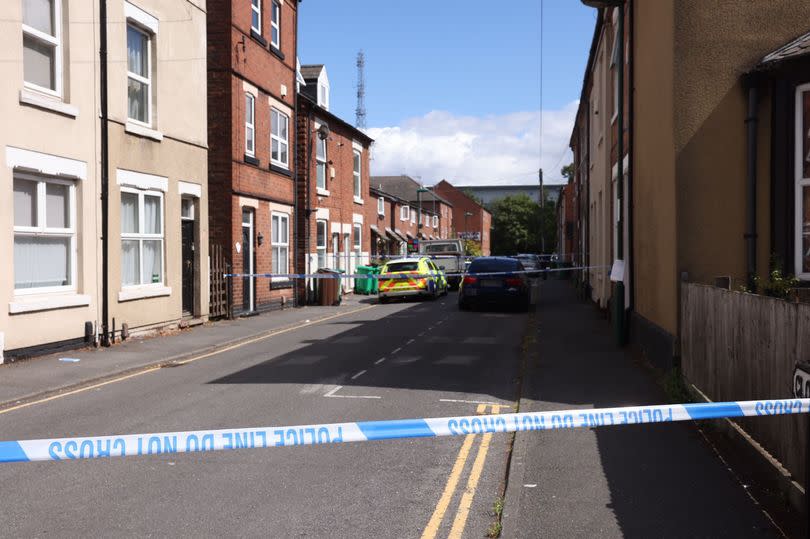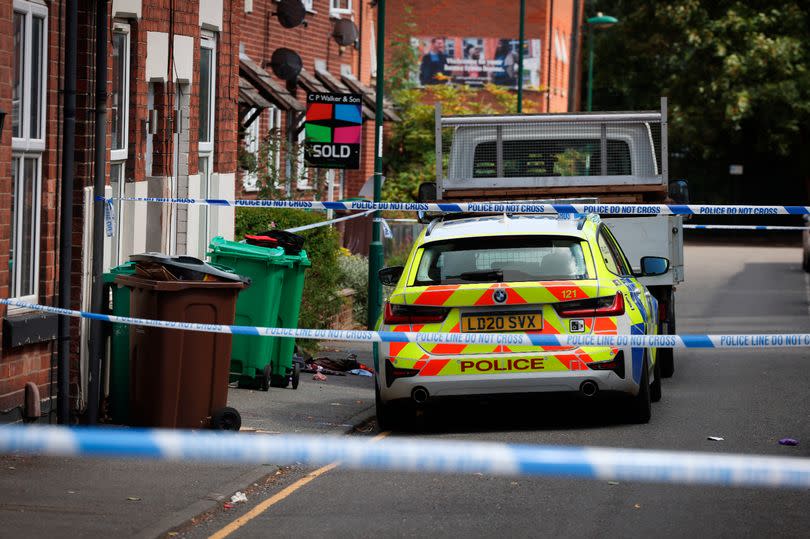Brenton Marriott's death 'could have been prevented had support agencies listened and intervened'
The family of a paranoid schizophrenic from Nottingham believe he would not have gone on to kill his father in a ferocious attack had he received the help they were so desperately crying out for. Delvin Marriott believes his nephew Rudi should have been properly assessed and monitored by the police and the mental health services in the years and months leading up to him stabbing to death 58-year-old Brenton Marriott in Lenton in August 2022.
He said his brother and nephew “dearly loved each other” and that Brenton “did everything he could” to support his son as Rudi's mental health spiralled and ultimately led to him stabbing his father 75 times in under three minutes. Following a trial at Nottingham Crown Court, a jury took just four hours to find him not guilty of murder but guilty of manslaughter by reason of diminished responsibility.
On Thursday, April 25, the 29-year-old father-of-one was handed a hospital order by Judge Stuart Rafferty KC, meaning he will stay in a specialist secure mental health treatment unit being monitored by experts and will only be released when they deem him not to be a danger to the public.
Get the latest news straight to your phone by joining us on WhatsApp
He said: “On August 5, 2022, you killed your father. You had armed yourself with a knife and, under the delusional belief you needed to defend yourself from him, an unarmed man, and you attacked him in a way that can only be described as ‘savagery’.
“Your family had recognised you were unwell and they had sought assistance many times for you. Like so many people with your illness you did not accept you are ill and that you needed treatment but they did and they tried.
“You killed your own father and by doing that you also destroyed your own family. You should prepare yourself for a long time in hospital.'
Following the sentence, Delvin said: “My brother lost his life because he cared, because he loved his son. My brother lost his life because his cries for help went unheard.
“Personally, I believe with the right support and professional intervention, the manslaughter of my brother could have been avoided. The NHS didn’t listen, the mental health support services didn’t listen, the police didn’t listen, key support services didn’t work together and as result a life has been lost, a young man’s life has been ruined, a family has been divided and broken and so many people have been left devastated.

“Rudi is ill and as a result killed his father. This I understand, accept and will have to forgive but I’ll never forgive, nor forget, the fact that if our publicly-funded support agencies had listened, acted and intervened my brother’s death could have been prevented.
“I pray my brother’s death will not be in vain and that important lessons will be learned and used to stop a tragedy like this from ever happening again.
“Brenton dearly loved his son and Rudi dearly loved his father and the father-son relationship between them was admired by many. Right up until the point of Brenton’s death he enjoyed with Rudi a loving, caring and protective relationship and Rudi benefited from a loving and caring extended family.
“Brenton did everything possible to support Rudi and meet his complex mental health needs, but Rudi received virtually no support from external professionals and his mental health difficulties were never accurately assessed, risk assessed, addressed or monitored by professionals.
“He tried to access professional help to no avail and in our opinion there was a direct correlation between Rudi being brutally attacked (a number of years ago), the associated brain injury and his mental health difficulties.”
The trial heard how Brenton, who visited his son almost every day and “saw helping him as his own personal mission” was repeatedly stabbed when he went to check on him at his home in Cloister Street, on the morning of August 5, 2022. He managed to get out of the property and passers-by and medical staff tried in vain to save him but did not succeed, such was the severity of his injuries.
The trial heard how in the years leading up to the killing, the defendant’s family had become increasingly concerned with his spiralling mental health decline. After being arrested for the stabbing he went on to tell nurses he believed his father had put a microchip in the back of his neck and was falsely having an affair with a former partner of his.
Prosecutor Harpreet Sandhu KC said the Marriott family began to become concerned about Rudi's mental health which they say began after he was the subject of a violent attack in his late teens. But the defendant never received any treatment, the prosecutor said. He said following the breakdown of a relationship with the mother of his child in 2019, Rudi Marriott began exhibiting anger issues and "spoke about hearing voices". Mr Sandhu said: "He was involved in a road traffic collision and as a result he was taken to hospital and when he was in hospital he spoke about having a chip in the back of his head which had been placed there without his consent. He said he wanted the chip to be removed."
The prosecutor said: "Brenton Marriott saw helping his son as his own personal mission and visited him on almost a daily basis. He would do anything for his son."
Mr Sandhu said after leaving hospital, Rudi Marriott was assessed and deemed "unfit to be interviewed" about the attack on his father. He said three different forensic psychiatrists later each also assessed the defendant and all concluded "that at the time of the killing he was suffering from an abnormality of mental function arising from a recognised mental condition and all agreed it would impair his ability to understand the nature of his actions and his ability to exercise self-control".
Delvin said: “On one occasion, when the emergency services were called because Rudi was having an episode, his sister made a desperate request for a mental health assessment for suspected paranoid schizophrenia. Rudi was assessed by the police, and mental health practitioners, as ‘fit and well’. There was no follow up, offer of support, risk assessment or monitoring, despite Rudi’s previous contact with the NHS and the ongoing mental health concerns expressed by himself and his family.
“The incidents, outbursts and abnormal behaviour continued and Brenton relentlessly tried to canvass help, and intervention, from the NHS and mental health services, only to be advised that because of Rudi’s human rights, he would have to self-refer – outside of that, they said ‘there’s nothing we can do’.

“Rudi did self-refer and was not taken seriously. I remember advising Brenton, around six months prior to his death, that if we were not afforded some proper professional support, ‘something bad was going to happen’. I now despair that something, far worse than I could ever have imagined, transpired.”
Following sentencing, Ifti Majid, chief executive of Nottinghamshire Healthcare, said: “Any loss of life in such circumstances is an absolute tragedy, and on behalf of the Trust I offer my sincerest condolences to Brenton’s family and friends.”
And a spokesman for Nottinghamshire Police said: “The mental health triage team, comprising an NHS mental health nurse supported by an officer attended an incident in August 2019 after concerns were raised about Rudi Marriott’s mental health. A mental health nurse was in attendance and made their professional assessment that Mr Marriott should not be sectioned under the Mental Health Act. Our thoughts remain with all of those affected by this tragic incident.”

 Yahoo News
Yahoo News 
